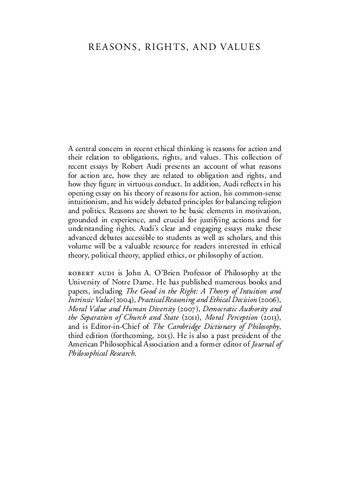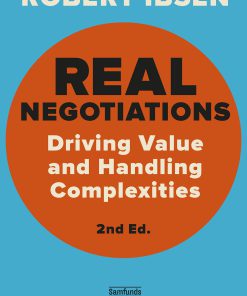Reasons Rights and Values 1st Edition by Robert Audi ISBN 9781316289945 131628994X
$50.00 Original price was: $50.00.$25.00Current price is: $25.00.
Reasons Rights and Values 1st Edition by Robert Audi – Ebook PDF Instant Download/Delivery: 9781316289945 ,131628994X
Full download Reasons Rights and Values 1st Edition after payment
Product details:
ISBN 10: 131628994X
ISBN 13: 9781316289945
Author: Robert Audi
Reasons Rights and Values 1st Edition Table of contents:
I Reasons for action
II Intuition, obligation, and virtue
III Religion, politics, and the obligations of citizenship
Part I Reasons for Action
Chapter 1 Reasons, practical reason, and practical reasoning
I Three overlapping categories of reasons for action
II Practical reason
III Practical reasoning
IV The Dimensions of assessment of practical reasoning
Some patterns of practical reasoning
Criteria for assessing practical reasoning
V A range of substantive principles of practical reason and practical reasoning
Hypothetical imperatives
Three kinds of normative principle
Toward sound principles of practical reason and practical reasoning
VI Practical reasoning and rational action
Chapter 2 Intrinsic value and reasons for action
I Some major elements in Moore’s theory of value
II Intrinsic, instrumental, and inherent value
III Intrinsic value, inherent value, and organic unity
IV Some problems of specificatory incompleteness
V The ontology of intrinsic value
VI The epistemology of intrinsic value
VII The intrinsically valuable as a basis of reasons for action
Conclusion
Chapter 3 The grounds and structure of reasons for action
I Experience, desire, and belief
II The mutual irreducibility of practical and theoretical reason
III Normative reasons
IV Intellect and will and the functioning of practical and theoretical reasons
V The relation between reasons and facts
VI Facticity versus factual groundability
VII Moral reasons
Chapter 4 Practical reason and the status of moral obligation
I Skepticism: general, moral, and practical
II Basic elements of practical reason
Sources and grounds of reasons
Normative externalism
The intrapersonal vs. the egoistic
The metaphysics of normative properties
Constitutive conditions and possession conditions
III The relation between practical and theoretical reason
IV The status of moral reasons
V Rationality, reasonableness, and moral judgment
The relativity and permissiveness of rationality
Rational agents and moral reasons
Rationality and reasonableness
Permissions, demands, and requirements of reason
VI Conclusion
Part II Intuition, Obligation, and Virtue
Chapter 5 Intuitions, intuitionism, and moral judgment
I The nature and varieties of intuitions
II The role of intuitions in prima facie justification
III Intuitive evidence and non-inferential justification
IV The intuitive apprehension of fittingness
V Intuitions, inferential processes, and inferential beliefs
VI The grounds and extent of intuitive knowledge and justification
VII Intuition and moral judgment
VIII Reasons for action and final obligation
Chapter 6 Kantian intuitionism as a framework for the justification of moral judgments
I Kantian intuitionism as an integrated view
II Thick and thin moral questions
Prospective and retrospective conduct questions
The scope and comprehensiveness of prima facie obligation
III The treatment of persons and the Rossian prima facie obligations
IV Reasons for action and final obligation
Weighting principles
Higher-order normative principles
Chapter 7 Moral virtue and reasons for action
I Moral virtue as an element in character
II Acting virtuously
III The nature and scope of motivational self-control
Some major types of control of reasons for action
Five dimensions of moral responsibility regarding practical reasons
The deontological analogue of the conception of acting virtuously
Can virtue be up to us?
IV The possibility of autonomy and the sustenance of virtue
Chapter 8 Virtue ethics in theory and practice
I Virtues as traits of character
II Virtue ethics as moral theory
III Normative virtue ethics
IV Virtuous persons, action from virtue, and virtuous action
Ethical decision
Rules of action
Traits of character and grounds of action
Aretaic and deontic conflicts
V Some major uses of aretaic concepts
Part III Religion, Politics, and the Obligations of Citizenship
Chapter 9 Wrongs within rights
I Sketch of a conception of moral rights
II The plurality of rights
III Morally protected moral failures: reprehensible exercises of rights
IV Ideals, oughts, and duties
Chapter 10 Religion and the politics of science
I The scope and methodology of science
Testability
Publicity
Empiricality
Fallibilism
The demarcation problem and theological testability
Methodological vs. metaphysical questions
II Is the scientific habit of mind theologically neutral?
III Philosophical naturalism as a worldview
IV The religious, the secular, and secularism
V A framework for resolution
Three institutional principles of church–state separation
Political constraints in a free democracy
Neutrality in education touching on religion
The preparation of science teachers
Conclusion
Chapter 11 Nationalism, patriotism, and cosmopolitanism in an age of globalization
I Nationalism
Extreme nationalism
Moderate nationalism
Minimal nationalism
Positional vs. attitudinal forms of nationalism
II Cosmopolitanism
Cosmopolitan values
Extreme cosmopolitanism
Moderate cosmopolitanism
Minimal cosmopolitanism
Resistance to sectarianism as common to cosmopolitanism and nationalism
III Domains of institutional authority
IV The multiple manifestations of globalization
Military globalization
Economic globalization
Healthcare and preventive medicine
Globalization at the cultural level
Is there an intrinsically international realm?
Index
People also search for Reasons Rights and Values 1st Edition:
reasons why individual rights are important
what are values and why are they important
characteristics of values rights and ethics
the value of rights answer key
why is rights and responsibilities important
Tags:
Robert Audi,Reasons,Rights,Values
You may also like…
Politics & Philosophy - Major Branches of Philosophical Study
The Range of Reasons: in Ethics and Epistemology 1st Edition Daniel Whiting
Jurisprudence & Law - Constitutional Law
Uncategorized
Reasons to Reason in Primary Maths and Science 1st Edition Alison Borthwick Alan Cross
Uncategorized
Human Rights and Dynamic Humanism 1st Edition Winston P Nagan John A C Cartner Robert J Munro
History - American Studies












